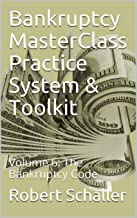Description
Bankruptcy MasterClass Practice System & Tool Kit – Volume 6: The Bankruptcy Code
Every attorney should read this book cover to cover before filing his/her first Chapter 7 bankruptcy case. This book explains the nuts and bolts of filing Chapter 7 – giving attorneys the confidence to provide competent representation to clients by exceeding the minimum competency level of the profession and exercising the skill, knowledge and ordinary care exercised by other attorneys.
This book is a primer, not a treatise. The goal of this book is to provide attorneys with a structural framework of the bankruptcy process, including a working knowledge of the relevant statutory and judicial authorities. The six types of bankruptcy cases are discussed before examining Chapter 7 eligibility requirements. Next, a day-by-day timeline is presented for a standard Chapter 7 case. Then, the roles of the U.S. trustee and Chapter 7 standing trustee are explored. Plus, the 11 U.S.C. § 341 meeting of creditors is explained followed by a sample Q&A of a typical § 341 examination. Of course, the 11 U.S.C. § 362 automatic stay protections and 11 U.S.C. § 727 bankruptcy discharge are discussed. Typical debtor motions are discussed with text of sample motions provided.
In sum, studying this book should help any attorney feel more competent to file his/her first Chapter 7 bankruptcy case. Attorneys who embrace this book will be able to better understand the Chapter 7 legal requirements, anticipate bankruptcy issues, and carefully prepare the required petition, schedules, and statements. Attorneys will also be able to help their financial troubled clients by:
- Offering a timeline to manage client expectations.
- Explaining the bankruptcy process to the client.
- Advising whether a client is eligible for Chapter 7 relief.
- Providing a client with a realistic outcome forecast.
- Advising a client whether Chapter 7 relief is the best chapter to seek relief.
- Identifying which assets are “exempt” from liquidation and which assets may be sold by the Chapter 7 standing trustee.
- Specifying which debts can be discharged and which debts survive the bankruptcy.
- Advising a client whether the client’s home can be retained after filing bankruptcy.
- Advising a client whether the client’s vehicle or other personal property can be retained after filing bankruptcy.


Tax Law (verified owner) –
The goal of this book was to provide attorneys with a structural framework of the bankruptcy process, including a working knowledge of the relevant statutory and judicial authorities. GOAL ACHIEVED!